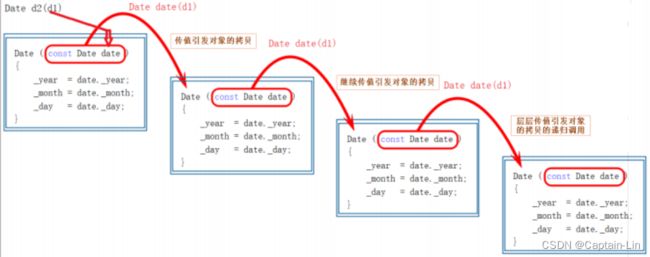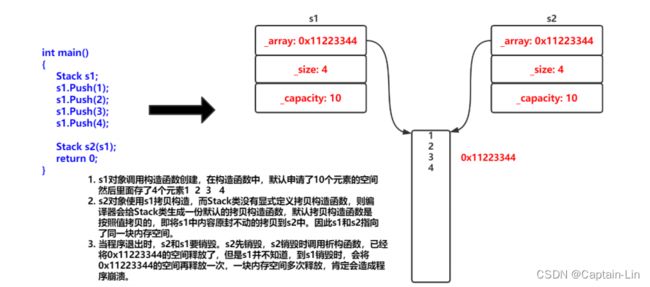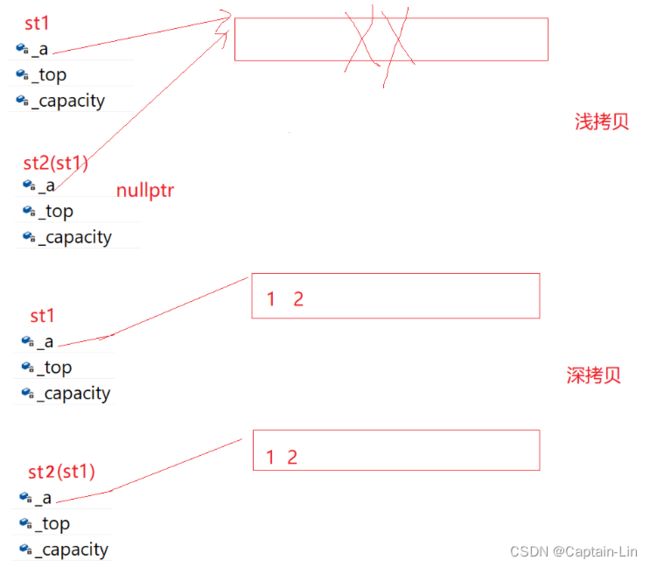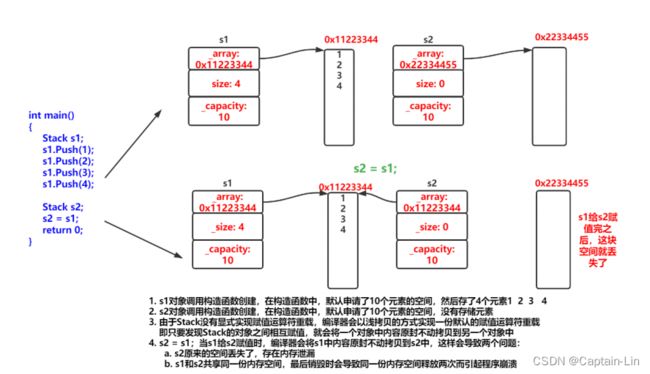【C++初阶】简析拷贝构造、赋值运算符重载
hello,各位读者大大们你们好呀
系列专栏:【C++学习与应用】
✒️✒️本篇内容:构造函数的概念与特征,基本使用方法;运算符重载,赋值运算符重载,前置、后置++的使用
作者简介:计算机海洋的新进船长一枚,请多多指教( •̀֊•́ ) ̖́-
同期文章:【C++初阶】简析构造函数、析构函数
目录
一、引言
二、拷贝构造函数
1.概念
2.特征
① 拷贝构造函数是构造函数的一个重载形式
② 拷贝构造函数的参数只有一个且必须是类类型对象的引用
③ 若未显式定义,编译器会生成默认的拷贝构造函数
④ 特殊情况下仍需使用显式拷贝构造函数(重要)
⑤ 拷贝构造函数典型调用场景(重要)
三、赋值运算符重载
1.运算符重载
2.赋值运算符重载
① 赋值运算符重载格式
② 赋值运算符只能重载成类的成员函数不能重载成全局函数
③ 内置类型成员变量是直接赋值的,而自定义类型成员变量需要调用对应类的赋值运算符重载完成赋值(重要)
3.前置++和后置++重载
一、引言
通过之前的学习,我们可以得知C++有空类时,编译器会自动生成6个默认成员函数。
默认成员函数:用户没有显式实现,编译器会生成的成员函数称为默认成员函数。
上一章节我们就对构造函数和析构函数进行了相应的学习,本章节我们再来谈谈拷贝构造和赋值重载。
二、拷贝构造函数
1.概念
顾名思义,拷贝构造函数的作用就在于,拷贝类的一个对象到另一个新的对象。
拷贝构造函数:只有单个形参,该形参是对本类类型对象的引用(一般常用const修饰),在用已存在的类的类型对象,创建新对象时由编译器自动调用。
2.特征
拷贝构造函数也是特殊的成员函数,其特征如下:
① 拷贝构造函数是构造函数的一个重载形式
② 拷贝构造函数的参数只有一个且必须是类类型对象的引用
使用传值方式编译器直接报错,因为会引发无穷递归调用。
class Date
{
public:
Date(int year = 1900, int month = 1, int day = 1)
{
_year = year;
_month = month;
_day = day;
}
//Date(const Date d) // 错误写法:编译报错,会引发无穷递归
Date(const Date& d) // 正确写法
{
_year = d._year;
_month = d._month;
_day = d._day;
}
private:
int _year;
int _month;
int _day;
};
int main()
{
Date d1;
Date d2(d1);
return 0;
}要了解为什么会引发无穷递归,我们先要知道为什么 Date( ) 只需要传一个数值,原因就在于 this 指针的存在,实际上 d2、d1的地址都要被传到函数中( *this 接收 d2 的地址),才能把数据拷贝到新对象。
Date是一个拷贝构造函数,实质上它是构造函数的一种重载形式,如果只传值,就会调用新的拷贝构造函数,然后无穷递归下去,导致程序崩溃。
【注意】在C++中,我们多使用引用而避免使用指针,原因是引用的程序效率更高,而 const 的作用就在于防止 d1 的数据被篡改和写反(d._day = _day,这样是错的),所以出现了上述代码表达:const Date& d
我们可以看一下下面的图解
③ 若未显式定义,编译器会生成默认的拷贝构造函数
默认的拷贝构造函数对象按内存存储按字节序完成拷贝,这种拷贝叫做浅拷贝,或者值拷贝。
class Time
{
public:
Time()
{
_hour = 1;
_minute = 1;
_second = 1;
}
Time(const Time& t)
{
_hour = t._hour;
_minute = t._minute;
_second = t._second;
cout << "Time::Time(const Time&)" << endl;
}
private:
int _hour;
int _minute;
int _second;
};
class Date
{
private:
// 基本类型(内置类型)
int _year = 1970;
int _month = 1;
int _day = 1;
// 自定义类型
Time _t;
};
int main()
{
Date d1;
// 用已经存在的d1拷贝构造d2,此处会调用Date类的拷贝构造函数
// 但Date类并没有显式定义拷贝构造函数,则编译器会给Date类生成一个默认的拷贝构造函数
Date d2(d1);
return 0;
}【注意】在编译器生成的默认拷贝构造函数中,内置类型是按照字节方式直接拷贝的,而自定义类型是调用其拷贝构造函数完成拷贝的。
下面是自定义类型 Time _t 调用其拷贝构造函数的证明
④ 特殊情况下仍需使用显式拷贝构造函数(重要)
编译器生成的默认拷贝构造函数已经可以完成字节序的值拷贝了,还需要自己显式实现吗?
当然像日期类这样的类是没必要的。但是如果出现下面这种类,程序就会崩溃,验证一下试试?
// 这里会发现下面的程序会崩溃掉?这里就需要我们以后讲的深拷贝去解决。
typedef int DataType;
class Stack
{
public:
Stack(size_t capacity = 10)
{
_array = (DataType*)malloc(capacity * sizeof(DataType));
if (nullptr == _array)
{
perror("malloc申请空间失败");
return;
}
_size = 0;
_capacity = capacity;
}
void Push(const DataType& data)
{
// CheckCapacity();
_array[_size] = data;
_size++;
}
~Stack()
{
if (_array)
{
free(_array);
_array = nullptr;
_capacity = 0;
_size = 0;
}
}
private:
DataType* _array;
size_t _size;
size_t _capacity;
};
int main()
{
Stack s1;
s1.Push(1);
s1.Push(2);
s1.Push(3);
s1.Push(4);
Stack s2(s1);
return 0;
}实际上代码崩溃的原因是什么呢?主要是因为虽然编译器完成了拷贝构造,但是新对象的 *_array 所指向的空间重复了,导致析构时重复释放了同一块空间。也就是说,默认拷贝构造函数会将对象的地址原封不动的拷贝到新对象中。
总结一下,就是涉及地址的类的对象,不能直接使用默认拷贝构造函数,需要自己显式实现(深拷贝);而只涉及简单内置类型的类的对象,能直接使用默认拷贝构造函数进行拷贝。
【注意】类中如果没有涉及资源申请时,拷贝构造函数是否写都可以;一旦涉及到资源申请
时,则拷贝构造函数是一定要写的,否则就是浅拷贝。需要写析构函数的类,都要写深拷贝的拷贝构造,如Stack;不需要写析构函数的类,默认生成的浅拷贝构造就可以用,如Date,MyQueue。
⑤ 拷贝构造函数典型调用场景(重要)
- 使用已存在对象创建新对象
- 函数参数类型为类类型的对象
- 函数返回值类型为类类型的对象
下面是一组拷贝构造函数使用场景示例
class Date
{
public:
Date(int year, int minute, int day)
{
cout << "Date(int,int,int):" << this << endl;
}
Date(const Date& d)
{
cout << "Date(const Date& d):" << this << endl;
}
~Date()
{
cout << "~Date():" << this << endl;
}
private:
int _year;
int _month;
int _day;
};
Date Test(Date d) {
Date temp(d);
return temp;
}
int main()
{
Date d1(2022, 1, 13);
Test(d1);
return 0;
}函数调用情况如下
三、赋值运算符重载
1.运算符重载
C++为了增强代码的可读性引入了运算符重载,运算符重载是具有特殊函数名的函数,也具有其
返回值类型,函数名字以及参数列表,其返回值类型与参数列表与普通的函数类似。
函数名字为:关键字operator后面接需要重载的运算符符号。
函数原型:返回值类型 operator操作符(参数列表)
###其主要目的是为了能让自定义类型能使用运算符 ###
注意:
- 不能通过连接其他符号来创建新的操作符:比如operator@
- 重载操作符必须有一个类的类型参数
- 用于内置类型的运算符,其含义不能改变,例如:内置的整型+,不 能改变其含义
-
作为类成员函数重载时,其形参看起来比操作数数目少1,因为成员函数的第一个参数为隐
藏的this -
.* :: sizeof ? : . 注意以上5个运算符不能重载。这个经常在笔试选择题中出现。
使用全局的 operator==,需要类中的成员对象是公有的
// 全局的operator==
class Date
{
public:
Date(int year = 1900, int month = 1, int day = 1)
{
_year = year;
_month = month;
_day = day;
}
//private:
int _year;
int _month;
int _day;
};
// 这里会发现运算符重载成全局的就需要成员变量是公有的
bool operator==(const Date& d1, const Date& d2) {
return d1._year == d2._year
&& d1._month == d2._month
&& d1._day == d2._day;
}
void Test()
{
Date d1(2018, 9, 26);
Date d2(2018, 9, 27);
cout << (d1 == d2) << endl;//考虑到优先级的问题,这里必须使用()
}使用全局的operator==,需要类中的成员对象是公有的,那我们还能优化吗?
优化方式:operator== 放到类中,同时根据类函数固有的this指针的性质进行一定修改。
class Date
{
public:
Date(int year = 1900, int month = 1, int day = 1)
{
_year = year;
_month = month;
_day = day;
}
// bool operator==(Date* this, const Date& d2)
// 这里需要注意的是,左操作数是this,指向调用函数的对象
bool operator==(const Date & d2)
{
return _year == d2._year
&& _month == d2._month
&& _day == d2._day;
}
private:
int _year;
int _month;
int _day;
};2.赋值运算符重载
① 赋值运算符重载格式
- 参数类型:const T&,传递引用可以提高传参效率
- 返回值类型:T&,返回引用可以提高返回的效率,有返回值目的是为了支持连续赋值
- 检测是否自己给自己赋值
- 返回*this :要复合连续赋值的含义
格式范例:
class Date
{
public:
Date(int year = 1900, int month = 1, int day = 1)
{
_year = year;
_month = month;
_day = day;
}
Date(const Date& d)
{
_year = d._year;
_month = d._month;
_day = d._day;
}
Date& operator=(const Date& d)
{
if (this != &d)
{
_year = d._year;
_month = d._month;
_day = d._day;
}
return *this;
}
private:
int _year;
int _month;
int _day;
};② 赋值运算符只能重载成类的成员函数不能重载成全局函数
简而言之,就是赋值运算符函数只能在类中使用
// 赋值运算符重载成全局函数,注意重载成全局函数时没有this指针了,需要给两个参数
Date& operator=(Date& left, const Date& right) {
if (&left != &right)
{
left._year = right._year;
left._month = right._month;
left._day = right._day;
}
return left;
}
class Date
{
public:
Date(int year = 1900, int month = 1, int day = 1)
{
_year = year;
_month = month;
_day = day;
}
private:
int _year;
int _month;
int _day;
};// 编译失败:
// error C2801: “operator =”必须是非静态成员
原因:赋值运算符如果不显式实现,编译器会生成一个默认的。此时用户再在类外自己实现
一个全局的赋值运算符重载,就和编译器在类中生成的默认赋值运算符重载冲突了,故赋值
运算符重载只能是类的成员函数。
③ 内置类型成员变量是直接赋值的,而自定义类型成员变量需要调用对应类的赋值运算符重载完成赋值(重要)
【注意】用户没有显式实现时,编译器会生成一个默认赋值运算符重载,以值的方式逐字节拷贝。
class Time
{
public:
Time()//自定义对象(Time_t)的构造函数
{
_hour = 1;
_minute = 1;
_second = 1;
}
Time& operator=(const Time& t)//自定义对象的赋值运算符重载
{
if (this != &t)
{
_hour = t._hour;
_minute = t._minute;
_second = t._second;
}
return *this;
}
private:
int _hour;
int _minute;
int _second;
};
class Date
{
private:
// 基本类型(内置类型)
int _year = 1970;
int _month = 1;
int _day = 1;
// 自定义类型
Time _t;
};
int main()
{
Date d1;
Date d2;
d1 = d2;
return 0;
}既然编译器生成的默认赋值运算符重载函数已经可以完成字节序的值拷贝了,还需要自己实
现吗?当然像日期类这样的类是没必要的。那么下面的类呢?验证一下试试?
// 这里会发现下面的程序会崩溃掉?这里就需要我们以后讲的深拷贝去解决。
typedef int DataType;
class Stack
{
public:
Stack(size_t capacity = 10)
{
_array = (DataType*)malloc(capacity * sizeof(DataType));
if (nullptr == _array)
{
perror("malloc申请空间失败");
return;
}
_size = 0;
_capacity = capacity;
}
void Push(const DataType& data)
{
// CheckCapacity();
_array[_size] = data;
_size++;
}
~Stack()
{
if (_array)
{
free(_array);
_array = nullptr;
_capacity = 0;
_size = 0;
}
}
private:
DataType* _array;
size_t _size;
size_t _capacity;
};
int main()
{
Stack s1;
s1.Push(1);
s1.Push(2);
s1.Push(3);
s1.Push(4);
Stack s2;
s2 = s1;
return 0;
}上述程序为什么会崩溃呢?事实上,这里可以和我们拷贝构造的知识结合在一起。原因就在于同一块空间的二次释放(s1的*_array的地址被完全复制到s1的*_array中)
【注意】如果类中未涉及到资源管理,赋值运算符是否实现都可以;一旦涉及到资源管理则必须要实现。
3.前置++和后置++重载
话不多说,直接上代码
class Date
{
public:
Date(int year = 1900, int month = 1, int day = 1)
{
_year = year;
_month = month;
_day = day;
}
// 前置++:返回+1之后的结果
// 注意:this指向的对象函数结束后不会销毁,故以引用方式返回提高效率
Date& operator++()
{
_day += 1;
return *this;
}
// 后置++:
// 前置++和后置++都是一元运算符,为了让前置++与后置++形成能正确重载
// C++规定:后置++重载时多增加一个int类型的参数,但调用函数时该参数不用传递,编译器
自动传递
// 注意:后置++是先使用后+1,因此需要返回+1之前的旧值,故需在实现时需要先将this保存
一份,然后给this + 1,而temp是临时对象,因此只能以值的方式返回,不能返回引用
Date operator++(int)
{
Date temp(*this);
_day += 1;
return temp;
}
private:
int _year;
int _month;
int _day;
};
int main()
{
Date d;
Date d1(2022, 1, 13);
d = d1++; // d: 2022,1,13 d1:2022,1,14
d = ++d1; // d: 2022,1,15 d1:2022,1,15
return 0;
}今天的内容大概就讲到这里啦,博主后续会继续向大家介绍更多实用有趣的工具,干货满满,如果觉得博主写的还不错的话,希望各位小伙伴不要吝啬手中的三连哦!你们的支持是博主坚持创作的动力!







